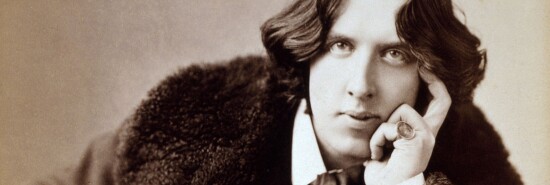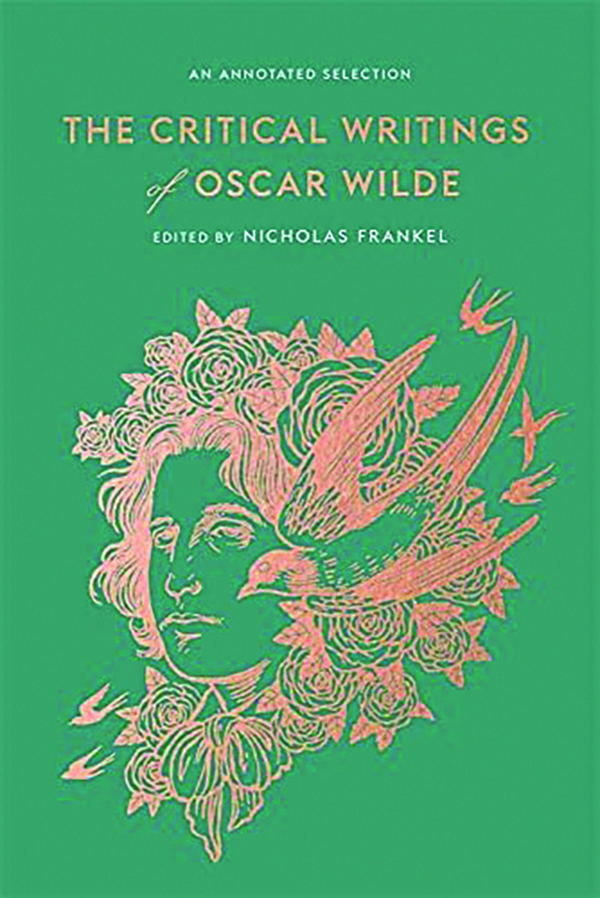
Where the Wilde think pieces are
D.J. Taylor
All Souls, the Oxford graduate college, used to be celebrated for its fellowship exam general paper. For three hours, luckless candidates would be expected to dilate on a single topic. Sometimes, a solitary abstract noun (genius, shame, pity) would stare balefully from the page. On other occasions, some luminous aphorism (“Peace is war waged by other means”) would demand comment. Browsing through The Critical Writings of Oscar Wilde, with its hoards of brightly burnished epigrams, its treasure troves of freshly minted brilliance, I realized that had he failed as a playwright, Wilde could easily have staked out a second career as an All Souls examiner. All that would need to be added to some of the suavities on display here was the word “discuss.”
There is a problem, though, with Wilde’s epigrams, such as “America has never quite forgiven Europe for being discovered somewhat earlier in history than itself.” Seen en masse, they start to irritate. The suspicion that in dipping into Oscar’s bran tub, you are liable to turn up handfuls of bran, as well as shiny baubles, is particularly evident in the preface to The Picture of Dorian Gray (“The artist is the creator of beautiful things. … Books are well written or badly written. That is all. … No artist desires to prove anything. Even things that are true can be proved.”) The best ones are infinitely suggestive, but the worst have all the resonance of a cracker motto. After two or three pages, the scintillation starts to dull, and you begin to wonder whether it was Wilde that G.H. Lewes, a Victorian wit of a slightly earlier vintage, had in mind when he pronounced that people who write for effect rarely manage to be effective.
Nicholas Frankel opens his bumper selection of Wilde’s critical work by trying to “place” his subject. Inevitably, most of the categories in which the author of The Importance of Being Earnest (1895) figures select themselves: “the paragon of wit and style, a pathbreaking sexual dissident, and the Victorian era’s greatest playwright,” naturally, but also “Victorian Britain’s most provocative, entertaining and forward-thinking critic.” To which might be added an amused spectator at virtually the last gasp of the late-19th century art-for-art’s sake movement (of which he remained a devotee while contriving to satirize some of its excesses), a proto-modernist, and, above all, a personality writer — in fact, possibly the greatest, or at any rate, the most notorious, personality writer British literature has ever produced.

How did Wilde (1854-1900) do it? Like Samuel Johnson before him and Hilaire Belloc and G.K. Chesterton a decade or so afterward, everything he produced was of a piece. Routine journalism; quasi-philosophical essays; teasing art criticism expressly written to annoy his friend-turned-enemy Whistler (vide: “Mr. Whistler’s Ten O’Clock,” over which Whistler must simply have writhed, what with the line about him speaking “with really marvelous eloquence on the absolute uselessness of all lectures of this kind.”) Each of these exhibits the same prodigality of style, the same charmed curiosity, the same resolve that every sentence shall count up to 10. A bonnet newly arrived from France (“Woman’s Dress”), or a series of literary monographs (“Great Writers by Little Men”) sets off exactly the same salvoes of earnest flippancy, or flippant earnestness, as a top-of-the-range calling card such as “The Soul of Man Under Socialism.”
One notes, alongside the constant aphorizing and the dazzling paradoxes — dazzling up to a point, as like most personality writers, Wilde never knows where to stop — that characteristic and no doubt deliberate disinclination to be drawn. To read the review of Walter Pater’s Appreciation, with an Essay on Style from 1890 is to marvel at its cascade of abstract nouns, the “purity” of Pater’s outline, the “perfection” of his form, the constant invocation of romanticism, classicism, and of course “beauty” — a throng of first principles screaming for precedence — and the almost complete absence of anything concrete. What, in the end, do you learn about Pater from it? Not very much, except that Wilde admires and is amused by him in about equal parts, finds in him the “union of personality and perfection” (which means what, exactly?), and thinks that he exemplifies the reason why an unbiased opinion is always valueless. A real, precise, quantifiable judgment would be a step too far — not what we expect from Wilde and certainly not what Wilde expected from himself.
Funny, provoking, and always making a virtue of what might in some quarters be regarded as its limitations (generalizing, teasing, not defining your terms), Wilde’s critiques of women’s headgear, the artist’s model, and guides to marriage have the additional merit of peddling their seriousness on the sly. “The American Invasion” and “The American Man,” for example, both from 1887, with their sharp, satirical portraits of trans-Atlantic visitors to Europe, may borrow their furniture from one or two of the social novels of the period but end up as pieces of comparative sociology. “They seem to get a hold on life much earlier than we do,” Wilde notes, almost wistfully, of the second demographic. “At an age when we are still boys at Eton, or lads at Oxford, they are practicing some important profession or making money at some intricate business.”
No one but Wilde, either, could have gotten away with an essay like “The Soul of Man Under Socialism,” which, again, takes a subject usually conceived of in practical terms and comes at it from a purely aesthetic angle. Socialism, according to Wilde, will benefit humankind largely by absolving it of the need for altruism: Charity, for so long rated as the great human virtue, will be exposed as paternalism’s dirty little secret. With true equality, there will be no need for it to exist. Meanwhile, there is another classic Wildean paradox stealing into view. Given equality, men and women will be able to become truly individual and creative beings. You could argue that the expression of that individuality and creativity will have the effect of making them unequal again, but this is beyond Wilde’s purview. To say that socialism will ultimately abet art is enough.
To read the two dozen pieces of which The Critical Writings consists is to wonder, in the end, whether this counts as criticism or is simply Wilde being Wilde. Nicholas Frankel, naturally, would incline to the former view. As an editor-cum-annotator, he is an odd amalgam of the scholarly and the populist, larding his introduction with quotes about Wilde’s “dialogic imagination” and references to academic theorists while seeming to assume that readers of his notes won’t know what a Bohemian is and need to have the parable of Lot’s wife explained to them. He also has an irritating habit of letting the annotations take precedence over the text so that a page containing three lines of Wilde is instantly swamped by three paragraphs of Frankel.
Still, this is an absorbing volume for which all Wilde fans should be grateful. It also prompts the question: What would have happened to Wilde had he lived another 40 years rather than dying at an age when most writers are only getting into their stride? One can see him taking an interest in the later stages of the Celtic Revival and being intrigued by Joyce. He would doubtless have felt greatly at home in the ’20s. The ’30s, by which time some of the implications of state socialism were becoming uncomfortably clear, would have been another matter.
D.J. Taylor is a British novelist and critic. His Orwell: The New Life will be published in the U.S. by Pegasus in May.
